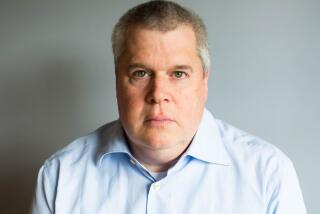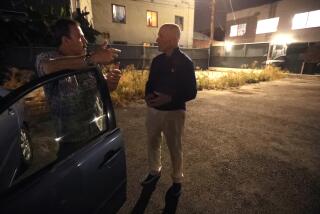In his footsteps
- Share via
Dead. Missing. Housed. Thus did poet Nick Flynn (“Blind Huber,” “Some Ether”) describe his father, who disappeared when Flynn was 6 months old. But then came the phone call 27 years later. “Get over here with your truck.... I’m sitting behind my door with a shotgun, waiting for the knob to turn.” Flynn tries to steer clear; he can’t. He goes to Dad’s rooming house and finds him “naked in a galvanized tin tub ... bathing and drinking straight vodka from a silver chalice, like some demented king from ... the Middle Ages.” Forget reunion; this is a threat, and the start of a rapprochement between father and son that lies at the heart of this less than pretty tale. Yet, told with energy, critical reflection and sensitivity, “Another ... Night ...” (the full unprintable title is the father’s description of life on Boston’s streets) is less a memoir than a study of one of America’s darker conundrums: homelessness.
Flipping between past and present, Flynn sorts out his family history. One chapter is a play, another a thesaurus-like gloss on inebriation. Some advance the story; others are more visceral, suggesting Lear, Beckett, Faulkner, Genet and forcing us to decide which is more painful: a parent’s lost dreams or a child’s lost innocence. He peels back the layers to 1956, when Dad first charmed Mom. They married; in 1960 Nick was born. Six months later, she packed up and left, and Jonathan Flynn was out of the picture. In 1964 he was arrested for stealing a car, arrested again 12 years later for passing forged checks. Mom wandered with her two children from rented room to rented room, crashed with friends, dated a succession of men and in 1982 committed suicide.
At 12, Flynn drank his first beer. At 15 he hid his drugs in a hollowed-out book. At 18 he crashed his motorcycle. “To hell in a handbasket” was how his grandmother saw his life. Then, in his 20s, he started working at the Pine Street shelter in Boston’s South End. It was 1984, when “Morning in America,” for some people, meant pulling down the shade to sleep off last night’s bender. “We catch them on the way down,” Joy, a one-time prostitute on the front desk, said of the clients. “Next stop, the morgue.” Flynn sees homelessness as a combination of factors: mental illness, lack of resilience, a ferocious autonomy, an insatiable thirst, an indifferent world. It’s easy to say we’re all just a broken leg away from homelessness, but by humanizing the cliche he shows us we’re a broken leg away from depression, loneliness and loss.
Flynn’s father comes to the shelter two years after that fateful phone call. Flynn captures the simultaneous filial pull and repulsion he felt as he realized he was following his father’s path, dodging the same demons: “What you fear your whole life comes to pass.... [Y]ou spend your life running from it but your foot is nailed to the sidewalk.” The semi-ironic tone is pitch perfect. “Another ... Night
More to Read
Sign up for our Book Club newsletter
Get the latest news, events and more from the Los Angeles Times Book Club, and help us get L.A. reading and talking.
You may occasionally receive promotional content from the Los Angeles Times.











